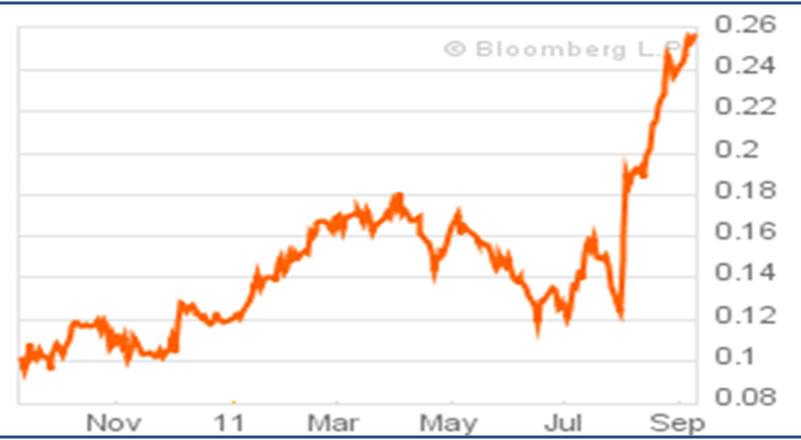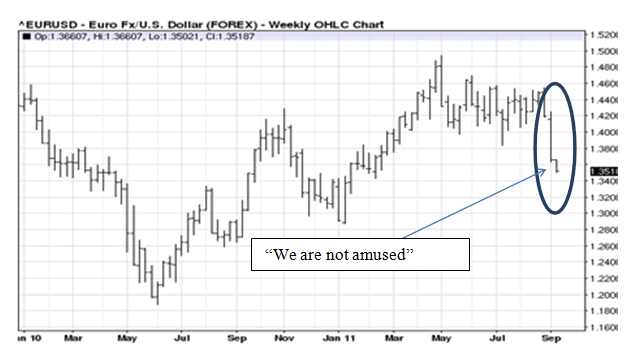Euro Drama Tough Love
Stock-Markets / Financial Markets 2011 Sep 30, 2011 - 02:30 AM GMTBy: HRA_Advisory
 The market refrain this month could be summed up with the phrase “just do something!” Growth continues to be slow and the spectre of debt default in Europe has cast a pall over the markets for the past three months. Unfortunately, the EU bureaucracy is not built for speed so the torture is likely to continue for a while yet.
The market refrain this month could be summed up with the phrase “just do something!” Growth continues to be slow and the spectre of debt default in Europe has cast a pall over the markets for the past three months. Unfortunately, the EU bureaucracy is not built for speed so the torture is likely to continue for a while yet.
Notwithstanding all the drama and lack of action it looks like the EU will do what it takes to avoid default and, ironically, markets are cheering that the thought that China might lend them some money. What a difference a couple of decades make.
Whatever the outcome, it will be combined with continued austerity so it’s not likely we’ll see pre-2008 growth rates any time soon. That will put a damper on industrial metal price gains though there will be room for gains on discovery when things stabilize.
In the short term gold prices will depend on traders opinion of which group of politicians looks stupider on a given day. Not an easy call, that. Eurodrama will cap the $US gold price and weak US statistics will improve it. That should leave gold in a broad channel until there is closure on Europe. In that environment we’re comfortable with good gold explorers but will be keeping the shopping to weak days for gold prices.

As we moved through the end of August politics again reared its head in the debt crisis. The market hasn’t liked the latest version of brinkmanship any more than the previous one despite moving the venue to Europe.
A number of state elections were held in Germany the first weekend of September and Chancellor Merkel’s party didn’t fare well. The Social Democrats, the national opposition party, won the state election by a 12% margin. Pollsters are blaming the loss and others earlier in the year on Merkel’s attempts to hold the Euro zone together with the help of German chequebooks. Social Democrat candidates were calling for Greece to be expelled from the EU. That was a vote getter. This wasn’t lost on bond traders who lifted Greek sovereign bond yields back above the 50% mark.
Northern Europeans are getting tired of underwriting their southern brethren. This is making the bond vigilantes restless again since no one has any illusions about who has to foot the bill. Ironically, it might have been easier to deal with this situation in early 2009 when the markets had already priced world ending scenarios in.
On the basis of maintaining some moral hazard the EU should have expelled Greece when it announced back then it was fudging the budget numbers. Three years of dithering means it will be difficult to extricate the EU from this impasse without serious consequences.
If one or more of the PIGS are forced out, their sovereign debt could be all but worthless. Everyone in EU leadership knows this already of course. Fear of systemic failure in Europe’s financial sector due to sovereign debt write downs has been a main driver of the bailout process.
The latest pullback accelerated when rumors started circulating that Germany was putting together plans to shore up its banking system in the event of a Greek default. We’d be shocked if core EU countries weren’t drawing up contingencies. That doesn’t make a default inevitable but does mean it’s getting serious consideration by core area politicians.
The level of fear was exacerbated by the announcement that Juergen Stark, German member of the ECB’s executive committee, was quitting in protest of the central bank’s recent bond buying. This buying is what capped bond yields on Italian and Spanish debt last month. In the wake of Stark’s announcement yields have risen again, with the Italian 10 year bond now yielding only a few basis points less than it did before the ECB buying campaign.
There have been several studies on costs to economies of leaving the Euro zone. Although Greece would get the benefit of a depreciable currency, it would endure all but complete debt default and the loss of most of its banking sector. Even trade would not get as much of a boost as hoped, since few traders would want to get paid in the currency of a bankrupt country. Overall, the loss to the Greek economy would be a catastrophic GDP decline of 50%.
Significantly, a pullout by Germany itself would be no picnic either. A very strong currency and loss of automatic access to so many markets would be a major blow. The cost of simply paying off Greek debt is actually a small fraction of the cost for pulling out of the EU for the average German. There are no free choices and the decision is now political. It’s quite conceivable the German populace will choose to stop underwriting Greece even if it’s a more expensive option.
The Chart below tracks the spread between 3-month LIBOR, the overnight lending rate between European banks and the Overnight Indexed Swap rate, considered a “risk free” rate. The LIBOR-OIS spread is a measure of bank’s willingness to lend to each other and the perception of financial sector risk. As you can see, it started rising sharply after EU officials left Athens. The spread is now about 3 times its long term average. That’s not good news, but it’s important to keep some perspective. The rate is still a small fraction of the 3-4% levels reached in 2008.

The markets are sending a pretty clear message that a decision on Greece and other peripheral EU nations is required. As days pass the markets are getting closer to pricing in the worst case scenario. Credit default swaps on Greek debt now imply a 98% probability of default. A default would be a huge shock to the financial system but the markets won’t be appeased by talk much longer. It’s time for a decision—any decision.
Metal Markets
Various market scares led to gold hitting yet another all-time high, briefly breaching the $1900 per ounce level. Uncertainty will be the byword for some time to come. That will be advantageous for precious metals, though recent events have complicated the market.
Traders’ frustration about EU inaction is getting taken out on the Euro. The weekly chart to the right shows how large this month’s downward move on the Euro was. This has helped the $US, as has the flood of safe haven capital into Treasuries. It has hit the gold price in recent sessions even when markets were down. Fear buying, has pulled gold back above $1800 though some of that will dissipate if things ever calm down. The same is true for the Dollar so those two markets could work against each other and keep gold in a broad trading range until we see a European resolution.
Tough markets hit base metals harder as they usually do. Copper continues to hold up well though it’s near the bottom of its recent trading range. We still think it’s vulnerable to a further drop. We note that recent trading stats show China buying more in August than it has since early this year. The same is true for iron ore, but that’s not helping explorers much.
The US has started its latest round of brinkmanship after Obama’s job speech. It’s too soon to tell how that will pan out though it sounds like at least some of the package will be passed. Most August economic numbers were better than expected and still portend slow growth rather than a double dip.
That is good news but it’s Europe that will dominate the agenda. Either some concrete solutions are put forward or the market will simply find a level that discounts a default by Greece and perhaps others.
Eurozone politicians vowed not to bend to the markets last month. High sounding language doesn’t mean much when the same governments have to resume borrowing days later. The markets need closure, not rhetoric.
If this drags on without resolution is may simply start getting ignored but traders bored with the issue. That, ironically, leaves rooms for gains but it’s not an issue you can ignore. Stay nimble and at least partially liquid.
Ω
Sign up to receive HRA commentary, interviews and our latest free special report on Iron Ore & Potash, including a new HRA recommended company! www.hraadvisory.com
By David Coffin and Eric Coffin
http://www.hraadvisory.com
David Coffin and Eric Coffin are the editors of the HRA Journal, HRA Dispatch and HRA Special Delivery; a family of publications that are focused on metals exploration, development and production companies. Combined mining industry and market experience of over 50 years has made them among the most trusted independent analysts in the sector since they began publication of The Hard Rock Analyst in 1995. They were among the first to draw attention to the current commodities super cycle and the disastrous effects of massive forward gold hedging backed up by low grade mining in the 1990's. They have generated one of the best track records in the business thanks to decades of experience and contacts throughout the industry that help them get the story to their readers first. Please visit their website at www.hraadvisory.com for more information.
© 2011 Copyright HRA Advisory - All Rights Reserved
Disclaimer: The above is a matter of opinion provided for general information purposes only and is not intended as investment advice. Information and analysis above are derived from sources and utilising methods believed to be reliable, but we cannot accept responsibility for any losses you may incur as a result of this analysis. Individuals should consult with their personal financial advisors.
HRA Advisory Archive |
© 2005-2022 http://www.MarketOracle.co.uk - The Market Oracle is a FREE Daily Financial Markets Analysis & Forecasting online publication.



